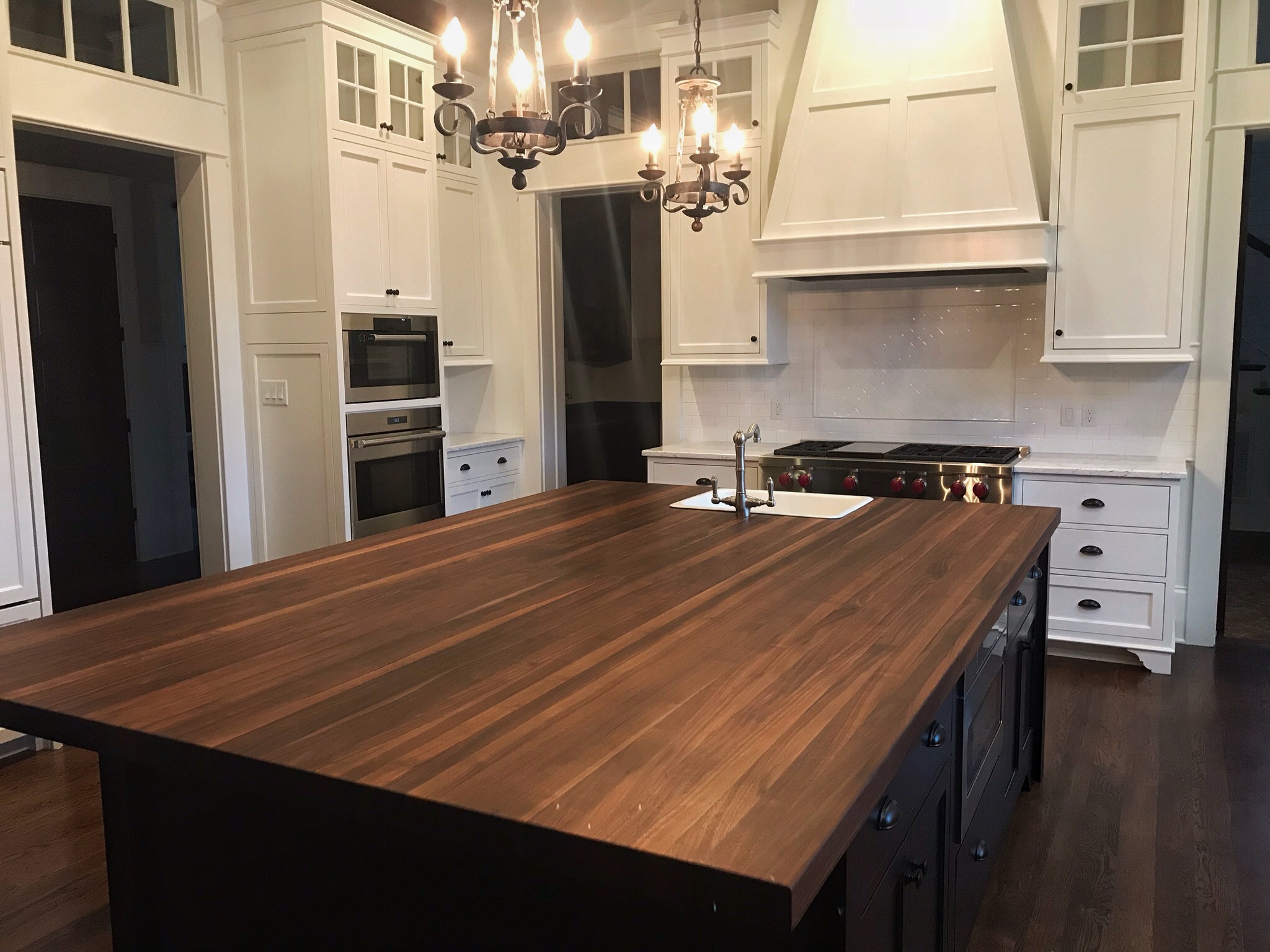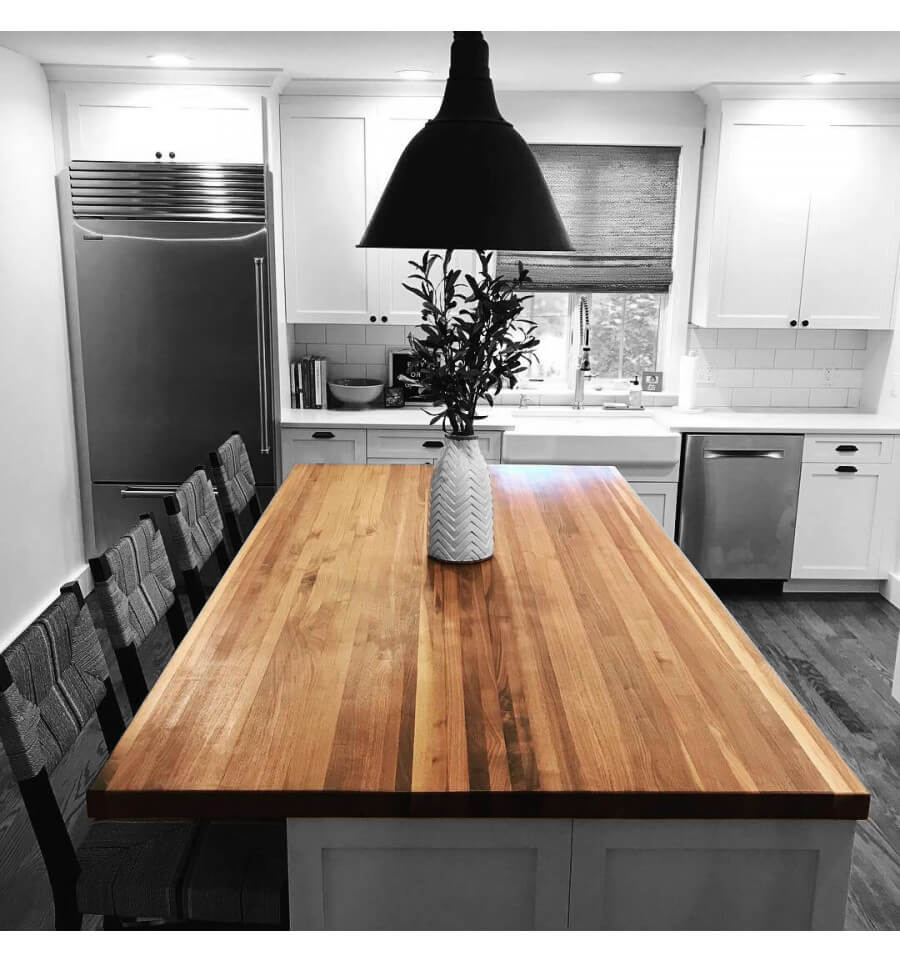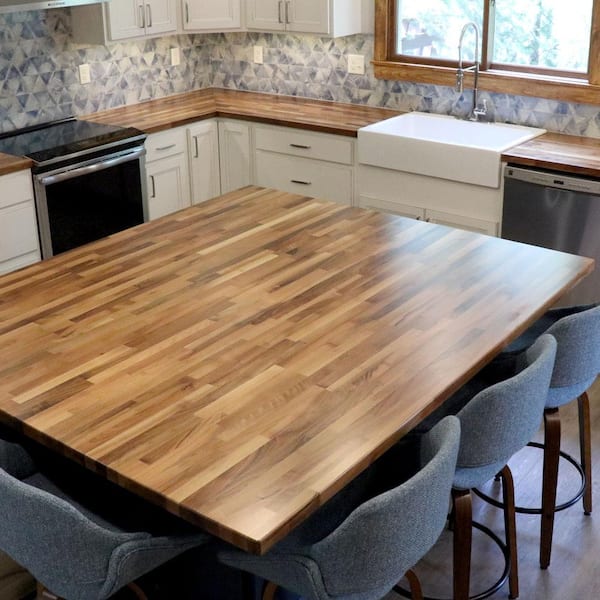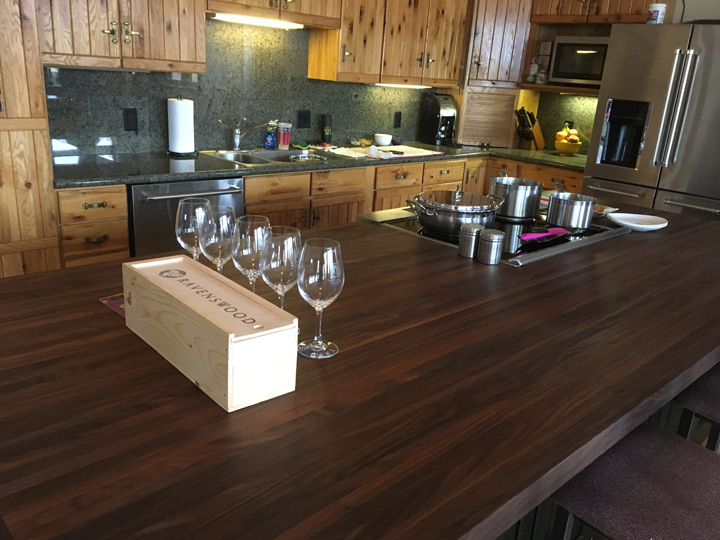Butcher block countertops made of walnut are an exceptional choice for kitchens, offering a unique combination of beauty, functionality, and warmth. I’ve always admired how walnut butcher block countertops create a sophisticated and welcoming atmosphere while also serving as a practical surface for food preparation. Unlike stone or synthetic materials, walnut adds an organic element to the kitchen, making it feel cozier and more natural. The luxurious appearance of walnut, combined with its strength and versatility, makes it a popular choice for homeowners looking to elevate their kitchen design.
Walnut is particularly prized for its stunning aesthetic. Its rich, dark tones, ranging from chocolate brown to golden hues, give it a distinctive and refined look. The grain patterns in walnuts are another standout feature, offering everything from straight lines to intricate swirls. What I find remarkable is how no two walnut butcher blocks are identical, thanks to the natural variations in the wood. This uniqueness means each countertop has its personality, adding character and depth to the kitchen.
Durability is a major selling point of walnut butcher block countertops. Walnut is a hardwood, making it strong enough to withstand the daily demands of a busy kitchen. Whether you’re chopping vegetables, rolling out dough, or setting down heavy pots, walnut holds up remarkably well under pressure. I’ve noticed that while walnut is durable, it’s also forgiving compared to harder surfaces like granite or quartz. Its slight softness means knives are less likely to dull when used directly on the surface, though I always recommend using a cutting board to keep the countertop looking its best.
One of the reasons I’m drawn to walnut butcher block countertops is their versatility. They complement a wide range of kitchen styles, from modern and industrial to farmhouse and traditional. The warm tones of walnut pair beautifully with white cabinetry for a bright, airy look or with darker cabinets for a more dramatic effect. Walnut also works well with various materials, such as stainless steel appliances, tile backsplashes, and stone sinks, making it a flexible choice for virtually any kitchen design.

Maintenance is an essential aspect of owning a walnut butcher block countertop. While walnut is durable, it requires regular care to maintain its beauty and functionality. I’ve found that applying a food-safe mineral oil or conditioner helps protect the wood from drying out and prevents cracks and stains. Regular cleaning with a damp cloth and mild soap keeps the surface sanitary and free of debris. Periodic sanding and resealing can also restore the countertop’s finish, ensuring it remains smooth and vibrant for years to come.
One of the things I love most about walnut butcher block countertops is their ability to age gracefully. Over time, the wood develops a rich patina that adds to its charm and character. This aging process enhances the depth and warmth of the walnut, making it even more beautiful as the years go by. I’ve noticed that this natural evolution is part of what makes walnut so appealing—it’s a material that tells a story and becomes a cherished part of the home.
Sustainability is another reason to choose walnut butcher block countertops. Walnut is a renewable resource, especially when sourced from responsibly managed forests. Opting for walnut countertops not only supports sustainable forestry practices but also reduces the environmental impact compared to synthetic materials. I feel good knowing that my choice contributes to preserving natural resources while also enhancing my kitchen with a high-quality, eco-friendly product.

Customizability is one of the standout features of walnut butcher block countertops. They can be crafted to fit any kitchen layout, whether you need a large island, a small prep area, or an integrated sink design. The edges can also be customized, with options ranging from sleek, square profiles to more decorative ogee or beveled designs. I appreciate how this flexibility allows me to create a countertop that perfectly suits my space and style preferences.
While walnut butcher block countertops are undeniably beautiful, they do require a certain level of care to prevent damage. Moisture is one of the biggest concerns, as prolonged exposure to water can cause the wood to warp or discolor. I always make sure to wipe up spills promptly and avoid placing wet items directly on the countertop. Using trivets or heat pads for hot pans and dishes is also essential to prevent scorch marks and preserve the wood’s finish.
One aspect of walnut butcher block countertops that I find particularly appealing is their tactile quality. The smooth, warm surface of the wood feels inviting and comfortable, making the kitchen a more enjoyable place to spend time. Unlike stone countertops, which can feel cold and hard, walnut adds a sense of softness and approachability to the space.
Cost is a factor to consider when choosing walnut butcher block countertops, as they are generally more expensive than other wood species. However, I believe the investment is well worth it for the quality, beauty, and durability that walnut offers. A well-maintained walnut countertop can last for decades, providing excellent value over its lifespan. Additionally, the timeless appeal of walnut ensures that it remains a desirable feature in your home, even as design trends change.
The natural antimicrobial properties of wood are another advantage of walnut butcher block countertops. While not as sterile as stainless steel, wood has been shown to inhibit the growth of bacteria, making it a safe and hygienic surface for food preparation. I still recommend regular cleaning and maintenance to ensure the countertop remains sanitary, but this inherent quality adds peace of mind.
Installing walnut butcher block countertops requires careful planning and professional expertise. While it’s possible to tackle a DIY installation, I’ve found that hiring a skilled installer ensures a flawless result. Proper installation is crucial for achieving a seamless look, securing the countertop in place, and preventing future issues like warping or uneven surfaces.

One challenge I’ve faced with walnut butcher block countertops is their vulnerability to scratches and dents. While walnut is durable, it is still wood and can be marked by sharp objects or heavy impacts. To minimize damage, I always use cutting boards for chopping and take care not to drop heavy items on the surface. Minor scratches can often be sanded out and refinished, restoring the countertop’s original beauty.
Another benefit of walnut butcher block countertops is their ability to improve the overall value of a home. Kitchens are a focal point for many buyers, and the addition of a high-quality walnut countertop can make a strong impression. I’ve noticed that the combination of functionality and aesthetic appeal makes walnut a sought-after feature that enhances both the usability and marketability of a home.
Overall, walnut butcher block countertops are a fantastic choice for anyone looking to combine style, functionality, and sustainability in their kitchen. From their stunning appearance and tactile warmth to their durability and eco-friendliness, walnut countertops offer a range of benefits that make them a worthwhile investment. With proper care and maintenance, they can become a lasting centerpiece in your home, providing both beauty and practicality for years to come.

Common Mistakes to Avoid
Skipping Regular Maintenance: One of the most common mistakes is neglecting to oil or condition the countertop regularly. This can lead to dryness, cracks, and an overall dull appearance. Always use food-safe mineral oil or a wood conditioner to keep the walnut hydrated and protected.
Exposing the Countertop to Excessive Moisture: Prolonged exposure to water can warp or discolor the wood. I recommend wiping up spills immediately and avoiding leaving wet items on the surface. Using coasters and mats can also help prevent water damage.
Using Harsh Cleaning Products: Abrasive cleaners and chemicals can strip the finish and damage the wood. Stick to mild soap and a damp cloth for cleaning, and avoid scrubbing with rough materials.
Ignoring Heat Protection: Placing hot pans or dishes directly on the countertop can cause scorch marks and damage the wood. Always use trivets or heat-resistant pads to protect the surface.
DIY Installation Without Proper Knowledge: Attempting to install walnut butcher block countertops without the necessary skills can lead to uneven surfaces, gaps, or poor sealing. I always recommend hiring a professional to ensure a flawless result.
Failing to Address Scratches or Dents: Minor scratches and dents are inevitable, but ignoring them can make the countertop look worn over time. Sanding and refinishing small blemishes promptly helps maintain its beauty.

How durable are walnut butcher block countertops?
Walnut butcher block countertops are highly durable and can withstand the daily demands of a busy kitchen. As a hardwood, walnut resists wear and tear, making it suitable for cutting, chopping, and heavy use. However, regular maintenance, such as oiling and protecting against moisture and heat, is essential to ensure its longevity.
How do I maintain walnut butcher block countertops?
Maintenance involves regular oiling with food-safe mineral oil or a wood conditioner to keep the wood hydrated and protected. Clean the surface daily with a mild soap and damp cloth, and avoid using abrasive cleaners. Periodic sanding and resealing can help address scratches or restore the finish, ensuring the countertop remains smooth and vibrant.
Are walnut butcher block countertops suitable for food preparation?
Yes, walnut butcher block countertops are ideal for food preparation, thanks to their durability and natural antimicrobial properties. While it’s safe to cut directly on the surface, using a cutting board is recommended to prevent scratches and prolong the life of the countertop.

Can walnut butcher block countertops handle moisture?
Walnut countertops can handle moisture when properly maintained and sealed. However, prolonged exposure to water should be avoided to prevent warping or staining. Wiping up spills promptly and using mats or coasters around sinks and wet areas can help protect the wood.
Are walnut butcher block countertops expensive?
Walnut is a premium wood, so its butcher block countertops are more expensive than options like maple or oak. However, the cost reflects the wood’s beauty, durability, and uniqueness. I see it as a worthwhile investment that adds significant value and elegance to your kitchen.
Can walnut butcher block countertops be customized?
Yes, walnut countertops are highly customizable. They can be crafted to fit any kitchen layout, with options for unique shapes, sizes, and edge profiles. This flexibility allows you to create a countertop that perfectly matches your design preferences and functional needs.

Butcher Block Countertop – Walnut and Maple Long Grain

Related articles:
- Mahogany Butcher Block Countertops
- Butcher Block Countertop For Kitchen Island
- Can You Paint Butcher Block Countertops
- Butcher Block Countertops With White Cabinets
- Pine Butcher Block Countertops
- Butcher Block Countertops Walnut
- Maple Butcher Block Countertops
- Care Of Butcher Block Countertop
- Butcher Block Countertops Maintenance
- Antique Butcher Block Countertops